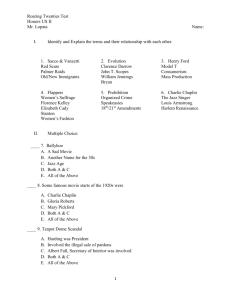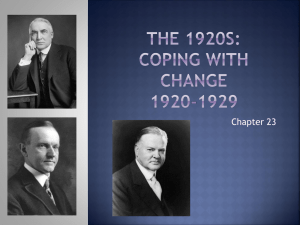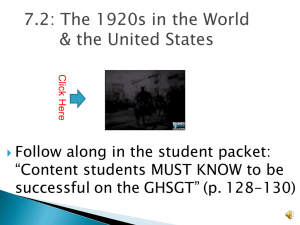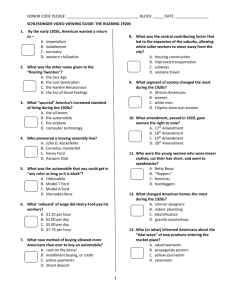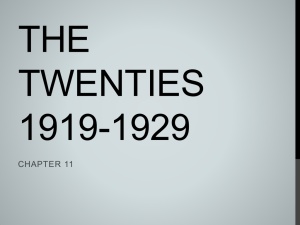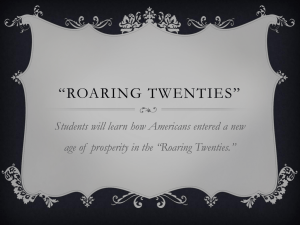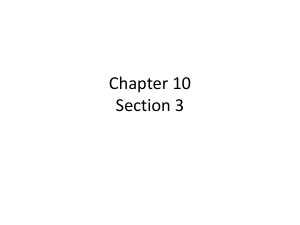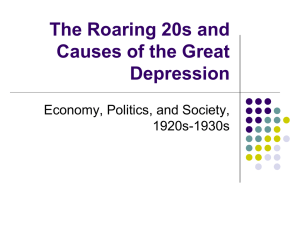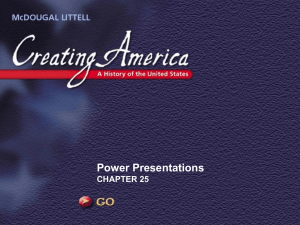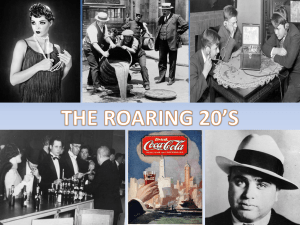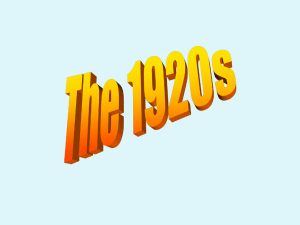Ch. 12 – Politics of the Roaring Twenties
advertisement
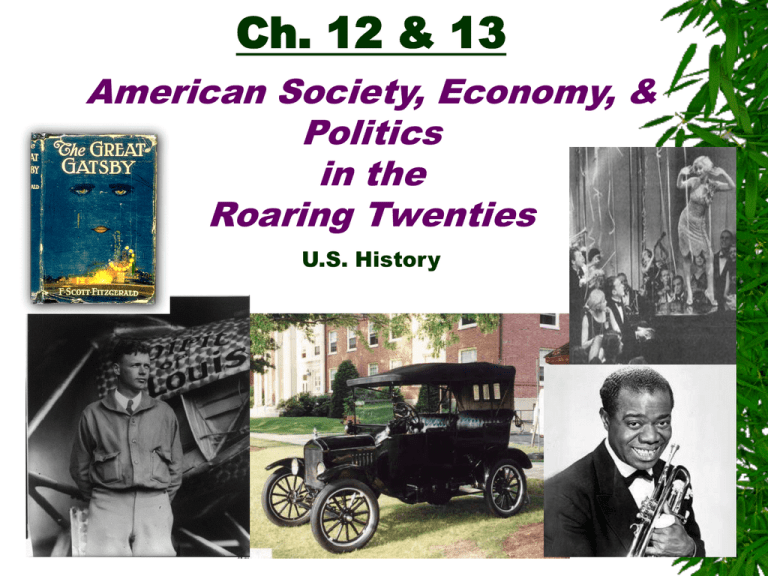
Ch. 12 & 13 American Society, Economy, & Politics in the Roaring Twenties U.S. History Fear of Communism (Red Scare 1919-1920) – “The Red Scare” began in U.S. in 1919 as Communists in Russia called for a world-wide revolution. Thousands of Americans panicked. – Attorney General Mitchell Palmer sent agents to hunt down Communists in U.S. – “Palmer Raids” violated people’s civil rights. Invaded homes, jailed w/out lawyers, deported immigrants. Red Scare Political Cartoon 1919 Trial of Sacco & Vanzetti – 1920, Italian immigrants Sacco & Vanzetti arrested for robbery & murder. Both men were radical anarchists – people who opposed any form of govnt. – Evidence against men was weak. Sacco & Vanzetti found guilty and executed. – Trial was famous in U.S.. Thousands of Americans protested as country realized Red Scare had gone too far… Ku Klux Klan – Resurgence of the Klan began in the South but also spread heavily into Southwest and the Midwest: IL, IN, OH – Resurgence spawned by 1915 movie Birth of a Nation, by D.W. Griffith. First blockbuster epic (3 hours) Based on 1905 book The Clansman: An Historical Romance of the KKK, by Thomas Dixon Opposed immigration, Catholics, blacks, Jews, Communists, bootleggers, gambling, adultery, and discussion of birth control Pro-WASP (White Anglo Saxon Protestant) Extremist and ultraconservative uprising against forces of diversity and modernity transforming American culture: nationalist, racist, narrow minded. Nativism: Anti – Immigration Laws: – Anti-immigrant attitudes grew in U.S. during 1920s, especially toward immigrants from southern & eastern Europe (where Communism began). – Immigrants competed for jobs, worked for low wages, might spread radical ideas (communism, anarchism, etc.) – Emergency Quota Act (1921) & National Origins Act (1924) Cut immigration to U.S. from southern & eastern Europe. Asians banned completely. Era of large-scale immigration to U.S. (1880s – 1920) ended! Congress abolished national origins quota system in 1965. Eugenics Popular movement in the 1920s - eugenic “science” promoted childbearing by "fit" classes & advocated birth control or sterilization of “inferior” people. – Racial minorities, ethnic immigrant groups, and handicapped were typically classified as unfit. – Movement became popular due to large influx of southern & eastern European immigrants from 1870s-1920s. – Eugenics was later discredited following WWII & the Holocaust when it became associated with racist ideas of Hitler & the Nazis (who also used eugenics to promote plans for a “master race”). John Scopes “Monkey Trial” (1925) – High school biology teacher in Tennessee arrested for teaching Charles Darwin’s theory of evolution in class (violated Tennessee’s Butler Law of 1924– “Divine Creation theory”). – Scopes defended by ACLU lawyer Clarence Darrow, most famous trial lawyer in the nation. – William Jennings Bryan prosecutor; Presbyterian Fundamentalist – Although Scopes found guilty, millions of American felt law had gone too far. – Issues of “monkey trial” – First Amendment rights (free speech), Modern America vs. Traditional Values. 18th Amendment – Prohibition (one of the last Progressive Era reforms) – Volstead Act of 1919 implemented the amendment banned all alcohol in the U.S. – Difficult to enforce. Lack of respect for law, not enough agents, alcohol could be made at home, etc. – “Speakeasies” - night clubs that served illegal booze to patrons who knew the password to enter the establishments. – “Bootleggers” smuggled illegal alcohol into U.S.. Rise in organized crime as gangsters fought over territory and distribution rights. Radios & Movies – Became a favorite pastime for many Americans. – Radio invented in Guglielmo Marconi, an Italian, in the 1890s. (Technology used for longrange communication during WWI) – Motion pictures inexpensive & fun to watch. – By 1929 radios were in many American homes. Families would gather after dinner to listen to popular radio programs together. – Radios & Movies helped unite Americans and create a new, popular culture. Women in the 1920s – “Flappers” term for “new women” of 1920s. Young, restless, eager to experiment. Shocked her elders w/ short skirts, bobbed hair, bright makeup. – Flappers refused to follow traditional rules. Used slang, smoked, drank liquor in public, etc. – As women became more independent, they continued to organize – National Women’s Party began in 1923 to agitate for an Equal Rights Amendment to the Constitution (ERA) -- Alice Paul Idea shocked traditionalists Amendment finally defeated in early 1980s. Changes for Women in the 1920s – 19th amendment granted all women the right to vote. – Flappers expressed changes in social values. – New electric appliances made lives of homemakers easier. Glenn Curtiss – Motorcycle racer turned aviator. A founder of the U.S. aircraft industry. – Considered the “Father of Naval Aviation” - responsible for the first aircraft to take off from and land on the decks of ships at sea. – Built many civil and military aircraft during WWI, 1920s, 1930s, WWII. Charles Lindbergh – Most admired hero of the 1920s. Symbolized American values of honesty and courage. – Made first non-stop solo flight across Atlantic Ocean. Flew from NY to Paris in his airplane, “The Spirit of St. Louis”. Harlem Renaissance – Harlem section of New York City became center of black cultural movement in 1920s. – Significance: Harlem produced a wealth of African American poetry, literature, art, and music, expressing the pain, sorrow, and discrimination blacks felt at this time. – Langston Hughes Best known figure of Harlem Renaissance. African American poet, wrote about black pride & heritage. – Other poets and writers: Claude McKay, Countee Cullen, Zora Neale Hurston Jazz – the American Sound – Began in New Orleans. Blended African rhythms w/ European harmonies. – Jazz unique – musicians improvise as they play & take “mood” a step further. – “Duke” Ellington (pianist) & Louis Armstrong (trunpet player/singer) famous black jazz musicians of the time. – Cotton Club in Harlem famous for its jazz. Tin Pan Alley – Section of NYC with many theaters & publishing houses – place where musicians would play their music for publishers & producers. – Would synthesize jazz, ragtime, and popular ballads into new sounds. Marcus Garvey – Leader of the United Negro Improvement Association (UNIA) – "Back to Africa Movement": Purpose was to promote the resettlement of American blacks in Africa. Advocated black racial pride and separatism rather than integration. – Urged blacks to buy only from blacks & founded chain of businesses including grocery stores, restaurants, and laundries. Garvey a native of Jamaica and founded UNIA there. – FBI director J. Edgar Hoover monitored Garvey and eventually sought to have him arrested and imprisoned. Garvey convicted of mail fraud in sale of his company's stock, imprisoned, and then deported. – Garvey instilled self-confidence and self-reliance among blacks, and later became the basis for the Nation of Islam (Black Muslim) movement in 1960s Booming Economy – 1920 – 1929 U.S. enjoyed extreme prosperity. – U.S. came out of WWI the world’s largest creditor nation. – Republican Presidents Warren G. Harding, Calvin Coolidge, and Herbert Hoover very pro-business & kept taxes low - "trickle down" tax policies favored the rapid expansion of capital investment. Americans annual income rose more than 35%. – Buying on credit (installment plan) became another innovative feature of the postwar economy. – Electricity became common in homes and workplaces. Americans bought new appliances like radios, vacuums, stoves, etc. Harding’s Presidency – Elected in 1920 – Harding spoke of returning America to "Normalcy“ Americans eager to turn inward and evade international issues. Many Americans were tired of the idealism, sacrifice and overreaching reforms of the Progressive Era and sought respite. – Conservative "Old Guard" wing of the Republicans now dominated Republican’s Conservative Economic Agenda (Harding, Coolidge, Hoover) – Conservatives believed role of gov’t was to make business more profitable. – Tax cuts for corporations and the wealthy: "trickle down" economics – Government’s role should be limited; stay out of business (laissez faire) Harding appointed people to regulate agencies that didn't like regulation – Government helped to facilitate monopolies and consolidation of industries Antitrust laws often ignored, circumvented, or inadequately enforced – Businessmen should run the government as they had experience in management. Cabinet positions went to wealthy business leaders who looked out for big business interests. – Hostile to Unions Membership in labor unions dropped nearly 30% between 1920 and 1930 Mass-Consumption Economy – Glorification of business --Business became almost a religion. – The Man Nobody Knows by Bruce Barton: top selling book in 1925-1926. Called Jesus the first modern businessman – "Picked up 12 men from the bottom of society and forged an organization that conquered the world." – "Every advertising man ought to study the parables of Jesus. They are marvelously condensed, as all good advertising should be.” – Calvin Coolidge: "The man who builds a factory builds a temple; The man who works there worships there.“ – Businessmen were considered the people that "ruled" the nation. Henry Ford & the Auto Industry – Detroit emerged as the automobile capital of the world – Ford focused on producing a car most Americans could afford. Ford realized workers were also potential consumers of his cars – In 1914, raised worker salaries from $2 a day to $5 if workers adopted "thrifty habits" (e.g. learn English, no gambling, drinking, etc.) – Ford paid good benefits, hired handicapped, convicts, and immigrants. – Ford called a "traitor" to his class by many wealthy people. – Model T car built using assembly line process. Became first mass-produced automobile made quickly & cheaply. Took only 1.5 hours to build a car (before assembly line: 14 hours) – Ford’s use of the assembly line made him about $25,000 a day during the 1920s – Auto sales soared by late 1920s. Impact of the Automobile – Suburbs began to grow as drivers were able to live farther away from jobs in cities. – Auto production generated new jobs in steel, rubber, and glass industries. – Roadside gas stations, motels, restaurants grew to meet needs of motorists. – Automobile became backbone of American economy from 1920s until 1970s…
